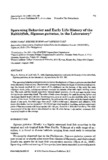Spawning behavior and early life history of the rabbitfish, Siganus guttatus, in the laboratory
Share
Abstract
The spawning behavior and embryonic and larval development of Siganus guttatus are described from laboratory observations. Characteristic prespawning behavior began 4 h before actual spawning: the female touched the anal region of the abdomen on the bottom of the tank; the male displayed short, jerky, rushing movements towards the female, often with rapid circling around her. The male and the female separately released small amounts of milt and eggs several times during the pre-spawning ritual. The color of both sexes changed, the male becoming lighter and the female darker in ground color. Spawning took place at 02.30 h on the third day after the first quarter of the moon. During actual spawning, the pair swam side by side, with the female slightly ahead of the male. Fertilized eggs were small (0.56±0.008 mm), demersal and adhesive, with many oil globules. Larvae measured 1.74±0.043 mm total length at hatching, and possessed eight pairs of free neuromasts with long cupulae (60–180 μm) from 6 h to 39 h after hatching. The adult complement of fin ray counts was attained on day 16 when larvae (=juveniles) measured 8.34 mm total length on the average.
Description
Contribution No. 203 of the SEAFDEC Aquaculture Department.
Suggested Citation
Hara, S., Kohno, H., & Taki, Y. (1986). Spawning behavior and early life history of the rabbitfish, Siganus guttatus, in the laboratory. Aquaculture , 59(3-4), 273-285. https://doi.org/10.1016/0044-8486(86)90009-8
Subject
Collections
- AQD Journal Articles [1249]

